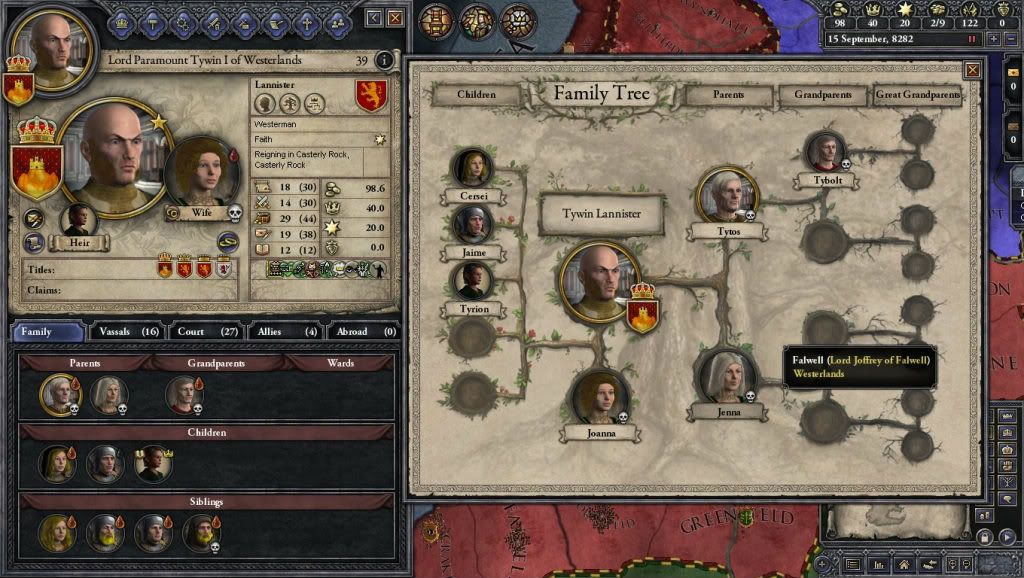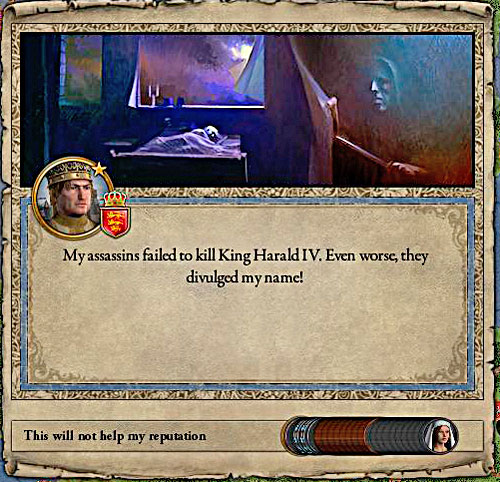Crusader Kings II is a Grand Strategy game that was released on February 14, 2012. The game is a mixture of the grand strategy that Paradox Development Studio is known for alongside expanded RPG elements. On game start, the player may hover over the map, which now spans from Spain in the west to India in the east and from Scandinavia in the north to Mali in the south. The character may select any Count, Duke, King or Emperor character (in ascending order of rank) between the years 1066 and 1337, with an end date of 1453, and each offers a different play style. Every title in the game has a de jure (by law) area that it controls, which may differ from the areas that title controls at any given start date. Each County is one province, while each Duchy is often between 3 and 5 Counties, each Kingdom has multiple Duchies and each Empire has multiple Kingdoms within its de jure land.
I. Learning Curve
Crusader Kings II, even two years after release, is not a game for the casual gamer by any means, but is most certainly the easiest to learn of the Paradox games preceding it. The tutorial found in the game, which was very unhelpful when I first bought it approximately 16 months ago, is even further out of date with all the expansions that have been released. I recommend simply playing the game and learning as you fail, with Ireland in 1066 the recommended area for new players to start their game.
The game, especially as a Christian lord, is mostly about marriage alliances and attempting to raise your family’s importance. You are tasked with finding marriage, which gives you alliances with your partner’s family (if they are nobility), and possibly the ability to press claims for your in-laws’ lands if your partner inherits such claims. This seems simple enough, but the game is notoriously difficult to begin. I personally had fun even while failing and not really understanding game mechanics early on, but I can understand why some would drop the game early.
It took me over 20 hours to have a basic understanding of the game and I was still making discoveries of game mechanics at over 100 hours of play time. This is partly due to the fact that there are so many options and actions one can take (not entirely a bad thing, as it shows the sheer volume of the game) but is also due to the fact that the developers at Paradox make the poor decision of using Medieval Latin terms that are wholly confusing to new players. The legal areas a title possesses (50+% is needed to create the title) is known as de jure, Latin for by law, while the term for the lands your ruler personally holds is demesne, a word I had to look up the pronunciation of (it’s di-main).
Eventually the player will learn the ins and outs of vassal management and holy warring, and the game becomes addicting when they have finally learned Crusader Kings II’s intense, unforgiving world. However, the road to becoming a baby assassinating, infidel slaughtering, family obsessed madman (AKA Tywin Lannister) is quite difficult.
You don't want to get on his bad side.
Learning Curve: 3/10
II. Graphics
Graphics in CKII are pretty much non-existent. Every character does have a semi-realistic portrait, which have grown on me over my time playing the game. The characters physical appearance is based off the genes of their parents and it is easy to see the family resemblance. However, the original game only shipped with two “ethnicity” portrait sets, light-brown skinned Arabic and pale European characters. Over the life of the game, more and more portrait sets have been released, with characters whose parents possess different portrait sets having a chance to inherit either set. These portrait sets sell for $1.99 when not on sale, and also greatly vary in quality, so it is recommended to buy them on sale for 75+% off.
The graphics on the map are rather vanilla as well. You can alternate between many different map types, such as terrain, independent and vassal borders, but I don’t find that the terrain map adds much if anything to the game. I play almost entirely in Independent Realms when at war, with occasional switching to the vassal borders and de jure map when managing my vassals, as the terrain map isn't pretty enough that it’s worth the disadvantages it brings in not being able to see the valuable information of the other maps.
The graphics of the army units are also unimportant. Each army is represented by a single man walking across the map with the number of men displayed below him. The base game contains very little variation between these units, and you can purchase more in mini-DLC, which I find rather unnecessary. These single men on the map also engage in combat with the other during battle, as the battle itself is not played out Total War-style but simulated based on number-crunching of the men in each army. Rather than seeing the battle, the player sees a rather stale animation of two men the size of a mountain stabbing each other, which can also be rather un-immersive.
Men the size of mountains. This is definitely not Total War
Graphics: 6/10
III. Gameplay
Your goal is to enhance the score of both your individual line of rulers and the dynasty as a whole. This is done through increasing your prestige through the possession of titles and increasing numbers of vassals. You also directly affect the stats of your heir by either selecting their tutor of tutoring them yourself. The abilities and traits of your ruler will have a direct effect on your vassals’ opinion, so it is very important to have a strong ruler. The opinions of vassals can affect both the frequency and magnitude of revolts against your rule, as well as the ability to raise levies while waging war. These factors make vassal management both important and sometimes tedious, especially as a larger realm. I sometimes find that the game gets too chaotic, but luckily the player can both change the game’s difficulty as well as the speed the game progresses at all the way down to a complete pause.
The player also is able to plot assassinations for enemies such as those pesky cousins who come between them and inheriting a kingdom. These plot events can be very satisfying as they bring some interesting and Easter egg-filled event messages, further adding to the RPG feel of the game.
This will hurt my street cred
That mention of assassination brings me to my final thought on the gameplay. Although it is a strategy game, its constant events and personal interactions with other characters keep it from being a true strategy game, and make it more an amalgamation of RPG and Strategy. You can accept an affair event and sire a dozen bastards, legitimize them and tutor them to become great commanders of your family. You can become a paranoid psychopath who defeats Cthulhu (but you’re the only one who sees it). You can conquer half the world as an Irish Muslim ruling Italy. The ability to make your own story, your own history, is what truly sets CKII apart from other strategy titles. I might leave to play another game but the addiction to Crusader Kings always returns. Once you’ve learned the game, it truly becomes a masterpiece, especially for those who are history buffs.
Gameplay: 9/10
DLC:
The game is also known for its vast number of DLC, both currently released and in development. Without purchasing these DLC, the game is very restrictive in playable characters (only Christian rulers may be played without them) and content, so I recommend waiting until a Steam sale (the game can often be found for 75% off) to buy the Crusader Kings II Collection (contains the Expansions: Sword of Islam, Sunset Invasion, Legacy of Rome, The Republic along with the corresponding minor DLC), and then purchasing The Old Gods, Sons of Abraham and Rajas of India on sale separately.
The major expansions do the following:
Sword of Islam: Unlocks the ability to play Islamic characters, which involves the managing of the dynasty’s decadence to prevent revolts and is much more war-focused, with little involvement in the area of marriage alliance and inheritance. The Muslims get new events, can marry four wives, and can go on Pilgrimage events.
Sunset Invasion: Causes the often-complained about Aztec Invasion, giving the western powers an invasion to worry about akin to the Mongols in the later game. It is the least essential of the main expansions, but fun for changing things up as a western power.
Legacy of Rome: This expansion adds events and abilities most focused on the Byzantine Empire, as the player is able to restore Rome if they accomplish the lofty requirements. This expansion also adds retinues, early standing armies that cost upkeep but also remove the necessity of relying entirely on your vassals for levies.
The Republic: This expansion adds the ability to play as merchant republics, a game that is mostly focused on controlling the trade zones through building outposts and keeping your family in power through investing in elections.
The Old Gods: Gives the ability to play as Pagan rulers, although the Norse clearly got the most attention in flavor. Additionally, it adds an 867 start date, allowing the player to begin during the time of the Viking Invasions of Britain and the
Sons of Abraham: This expansion unlocks playable Jews, although they are only available in the 867 Khazars of modern-day Ukraine, a vassal of 1066 Cumania and, following Rajas of India’s release, The Dukes of Semien in modern-day Ethiopia. This expansion also adds Papal Elections, as you can invest money towards getting priests from your realm into the College of Cardinals, similar to republic elections. Also there are many flavor events for Christians and Muslims such as Christian Pilgrimages and Muslims can now be members of either the Ash’ari or Mu’tazilite schools of thought, with corresponding bonuses. Lastly, heresies can overtake the main religion and become the new orthodoxy.
Rajas of India: The patch with this latest expansion added the entirety of the Indian subcontinent to the map, but the expansion is required to play as rulers of the Jain, Hindu and Buddhist religions. The Indian rulers have their own events based on their location as well as game mechanics. Rulers in India belong to different castes and it is important to stay in a higher caste for both prestige and vassal opinion. It is also possible to switch religion once per lifetime amongst the Indian religions, allowing the player to now take advantage of the religion that benefits their current situation.
The game has also been updated through free patches that go alongside the expansions, a welcome practice that has brought both changes big (such as levy and combat changes or the addition of Ironman mode) and small (the addition of an auto plot feature) that have really improved the game since I purchased it.
The game has also spawned some very well enjoyable fan-made mods, which can be found on the Paradox forums, where you must first register your game to view the mods. These mods include, but are not limited to: A Game of Thrones based on the world of A Song of Ice and Fire, Elder Kings based on the world of the Elder Scrolls, Diadochi Kings based on the Diadochi Wars following Alexander the Great’s death, Historical Immersion Project, adding many improvements to the base game’s timeframe, and Lux Invicta based on an alternate history with many divergences from history leading up to 1066.
Final Thoughts



















